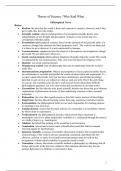Theory of Science | Who Said What
Philosophical Views
Basics:
• Realism: the idea that the world is there and a person is a passive observer, and if they
get it right, they have the reality.
• Scientific realism: objects and properties of an accepted scientific theory exist
independently of our thought and perception. A theory is true if and only if it
corresponds with that reality.
• Essentialism (philosophical realism): based on the elements of the periodic table; if a
construct changed the elements and their properties won’t. The world is out there and
it is there for us to discover. It is not constructed by humans.
• Constructionism: emphasizes how the observer’s descriptions (investigations) change
the world. We are then active observers.
• Social constructionism (philosophical idealism): thoughts shape the world. The world
is constructed by our consciousness. This view was first based on religious views.
• Idealism: see social constructionism.
• Metaphysical realism: part of philosophy that tries to understand what the world is
really like.
• Instrumentalism/ pragmatism: Objects and properties of an accepted scientific theory
are instruments to correlate and predict the results of observation and experiment. I.e.,
we don’t speak about truth, let’s just use these instruments, and all the knowledge/
data that we get are in a way subject to what we start out with. That’s the only thing
we can do. Let scientific tools do one’s work and not worry about these difficult
philosophical questions. Let’s do what works and use theories to do what works.
• Essentialism: the idea that the only good scientific theories are those that give ultimate
explanations of phenomena in terms of their underlying essences or their essential
properties.
• Rationalism: the view that regards reason as the chief source and test of knowledge.
• Empiricism: the idea that all learning comes from only experience and observations.
• Existentialism: the philosophical belief we are each responsible for creating purpose
or meaning in our own lives.
• Falsificationism: claims that the main activity of a researcher is to invalidate a theory
by observation or experiment.
• Verificationism: the philosophical doctrine which asserts that a statement is
meaningful only if it is either empirically verifiable (i.e. confirmed through the senses)
or a truth of logic (e.g., tautologies).
• Nihilism: the belief that nothing in the world has a real existence.
• Nominalism: interaction between name (classification) and that which is named
(moving targets by Ian Hacking).
• Epistemic humility: a posture of scientific observation rooted in the recognition that
(a) knowledge of the world is always interpreted, structured, and filtered by the
observer, and that, as such, (b) scientific pronouncements must be built on the
recognition of observation's inability to grasp the world in itself.
• Naturalism: a theory that relates scientific method to philosophy by affirming that all
beings and events in the universe (whatever their inherent character may be) are
natural. Split into two (Schleim is interested in this)
1
, o Ontological: the view that the world is, basically, like (natural) science is
telling us; especially the exclusion of spiritual realms/entities (inductive. We
have no theory of the world).
o Epistemological: the view that the (natural) science can explain everything that
can be explained. It puts psychologists un a position of ‘should we even be
here?’
Classics:
• (Logical) Positivism à the demarcation criterion of scientific statements is their
verifiability. That is, statements are scientific (and have meaning) if and only if we can
say under which conditions they can proven to be true. The words/ way to define
something is very important here (power of definitions). Their method of choice was a
combination of pure observation statements with a logic of induction. They did not
like theories. They thought: “If we observe enough, we will get close to the truth.”
However, only singular, so no general, statements can be verified. This is the problem
of inductivism. Also, scientific observations are dependent on theories, boundary
conditions, etc. It does not make sense to speak of ‘truth’ as this depends on your
definitions. Finally, scientists often refer to unobservables in their theories long before
it is clear how such statements should be confirmed; and they do so successfully.
• Falsificationism à what does a theory that ‘explains’ every possible outcome, that
rules out nothing, ultimately explain? A theory that explains everything is not
scientific. The idea is that genuine scientific theories rule out a range of observable
states of affairs by making definite predictions. That is, scientific theories are
falsifiable. This is why homoeopathy is pseudoscience. However, if not only theories,
but also observations are fallible, how can we ever be certain that falsified a theory? If
a theory is tested, the test will include initial conditions and auxiliary assumptions. A
negative outcome does thus not necessarily falsify the theory. There is also historical
implausibility: scientists often had to defend new theories even if they were ‘falsified’
by observations at the outset.
• Behaviourism à the view that science must be objective (this is positivistic thinking)
and, in psychology, only behaviour can be objectified.
Ways of reasoning
• Induction (down-up) à from observations to generalisations. Gathers new
information but is not truth-generating. Present in ‘Life, Human, Behavioural & Social
Sciences’.
• Deduction (top-down) à from generalization to prediction. Is truth-preserving but
adds no new information, and is rare. Present in ‘(Basic) Natural Sciences’.
• Abduction à looking for the best explanations. Gathers new information but crucially
depends on knowledge and (previous) information. Present in ‘Life, Human,
Behavioural & Social Sciences’ and ‘Real Life & Law’.
Week 1: The Power of Definitions
Learning objectives:
- What is Theory of Science about? (→ Lecture 2) How to organize a Students’
Lecture?
- Example: Science vs. Spirituality, how to argue?
- How is science based on definitions?
o Example: What kind of things are mental disorders? (homosexuality; →
Lecture 5)
2




